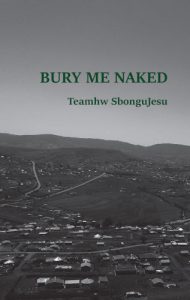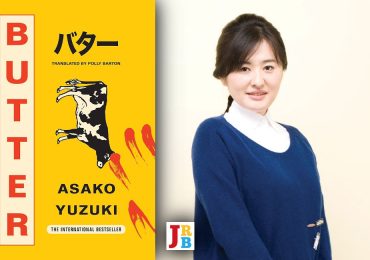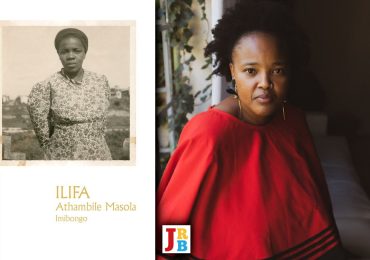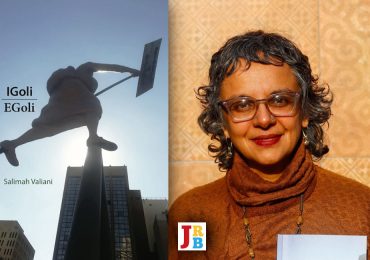Teamhw SbonguJesu’s debut collection of poetry, Bury Me Naked, delivers a conscientious, humorous, much-needed lesson in a poetics of voice that is sure of itself, writes Dimakatso Sedite.

Bury Me Naked
Teamhw SbonguJesu
TNG Publishing, 2022
The debut collection from Teamhw SbonguJesu Bury Me Naked comprises a series of narrative poems written in simple, conversational language—the language of ordinary people. Thematically, the book covers alcoholism, substance abuse, eroticism, father-son relationships, survival, corruption, death and spirituality; and the themes add up into a work that is unapologetic, evocative and darkly humorous.
SbonguJesu strives to connect with the reader not through aesthetics, but through a portrayal of the lives of the poor who, despite an abundance of simple pleasures, continuously face risk and lack. Their lives serve as a motif for a wider social context. In the opening poem, ‘The beginning’, the speaker enters the scene with a dramatic monologue:
It happened in October 1995.
Behind in rent
by a month or three;
my father, the beast, kept demanding
that mother pays her rent.
The poem defly illustrates the distinct way in which this particular community speaks:
He demanded to be let in;
for the first time, she let him in.
When inside he, again, demanded to be let in.
She again let him in.
He slept there.
The innuendo-laden refrain ‘to be let in’ refers, of course, both to the domineering father’s demand to be let into the house and his demand for sex. What SbonguJesu chooses to deprive his work of in terms of imagery and sonic rhythm he makes up for in other ways, such as via the anaphoric repetitions seen here—‘Behind in rent’, ‘pays her rent’; ‘to be let in’, ‘let him in’—which give the poem a cadence reminiscent of rap, and add substance to the lines.
Another strength is what might be called the breath of the work, which echoes natural speech, ending where a thought ends, allowing the reader to apprehend the gist of a poem while also providing room for the element of surprise. For example, this excerpt from ‘The deepest high’:
I once tried to hang myself,
tied a rope to my room’s roof.
But the thought of my neighbours’ laughter
did not allow me to kick the chair.
SbonguJesu’s ability to build tension in his verse allows it to move towards a resolution laced with shock, as in this stanza from ‘Handcuff all the angels’:
Hang his son Christ.
Not his portraits, rosaries or sculptures.
But Him.
Hang Him again,
and put all the nails,
not in His hands, but in His neck.
The incantatory rhythm here, brought about with chant-like metre, suggests an African spiritual, or a speaker under a spell; it is almost spontaneous, momentary, using the symbol of the debased Christ to call upon the audience to interrogate what is foreign, what has replaced the community’s African way. It reminds us that without the participation of the audience, an African poem is incomplete.
Some characters seem irredeemable, hedonistic and naively fatalistic, as at the end of ‘There’s more to life’, which contains another of SbonguJesu’s comedic punchlines:
Nights like these remind me of
my English teacher back in school
who used to stare at me for a long time
and thereafter tell the class ‘There’s more to life
than sex, drugs and partying.’
I always wanted to ask him:
‘Like what?’
And yet there is empathy and innocence, too, as in the voice of the child-speaker in ‘Waking up for school’, who narrates that:
Skhumbuzo’s stomach is making noise
and the boys next to him are laughing.
He thinks they are laughing at his shoes.
SbonguJesu also uses community-specific scamtho or slang to add to his chorus of poetic but natural voices. The speaker in the poem ‘Green’, for example, is more streetwise, using phrases such as ‘tall bong’, ‘two-pull-vaai routine’ and ‘green’, to refer to marijuana and the different ways of rolling and smoking it. This speaker is different from the more brazen voice in the ode ‘Shout out’, who gives a:
Shout out to the card scammers,
the ATM bombers,
the heist guys,
the fake certificate
and the license sellers,
the ganja sellers,
and those who don’t need a license to sell liquor.
The influence of traditional African poetry is evident here, again: like the iimbongi/baboki/African praise poets, the speaker applauds these individuals while simultaneously condemning their behaviour.
SbonguJesu’s use of distinct colloquial voices imparts to the reader that each speaker is unique in personality, age and moral sense, as well as portraying the subcultures and politico-historical eras within which the speakers are embedded. This preempts any voyeuristic inclination some readers might have to turn the poet into the object of their gaze, into the real subject of interest. Readers’ engagement, instead, remains on the page.
But SbonguJesu does not always portray reality as it is. At times he ventures into what some may refer to as magical realism, fusing the real with the supernatural, a worldview that evokes Wole Soyinka’s African metaphysics, as outlined in Myth, Literature and the African World, in which one inhabits the world of the dead, the living and the unborn, and the present and the past, simultaneously. In the poem ‘Dream set in heaven’, the speaker and his friends steal ‘Christ’s cellphone and platinum watch’ while a church sermon is in process; in ‘News about His passing’, the speaker laments that ‘God has died. / His funeral will be in a few days’ time.’ As the Senegalese poet Léopold Senghor put it, ‘African poetry is inherently social and communal’. It is also incomplete without the spiritual, the moral, a prayer, a song.
The stark, dark tone that cuts across Bury Me Naked could tempt the kind of reader who is around the (African) context, but not in it, to consider the poems from a Eurocentric point of view that reduces the Black experience to a series of stereotypes. And, admittedly, on a few occasions SbonguJesu’s direct style causes some poems to lose momentum, entering territory that makes them susceptible to lazy readings. This might have been counterbalanced by including poems with a contrasting tone into the fold, for a more varied portrayal of the human condition. However, to borrow Henry Louis Gates Jr’s words, a book also needs ‘to speak for itself’—in this case, in the Black tradition—rather than to be read in terms of what has been ‘appropriated from without’.
Bury Me Naked’s lucid and accessible style demonstrates the power of simple words to connect the reader with a poem emotionally. SbonguJesu’s effortless morphing of European modernist realism with contemporary millennial Afro-poetics and traditional spirituals; his spontaneity; his ability to write without self-censorship to meet the needs of a poem; all this adds up as a testament to his intuition. According to Matthew Omoko, ‘art is for all … as original as sin’. Here we have a portraitist whose sketches are his polemic, and they deliver a conscientious, humorous, much-needed lesson in a poetics of voice that is sure of itself.
- Dimakatso Sedite was born in Bloemfontein in 1969. She trained as a research psychologist and has worked in the areas of child rights, livelihoods and HIV/Aids. Her writing has appeared in several anthologies, journals and blogs. She was a joint winner of the 2019 Dalro Poetry Prize for the best poem in the journal New Coin. Her collection Yellow Shade was shortlisted for the Ingrid Jonker Prize and won a NIHSS Award.





